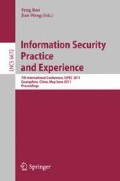Abstract
Obfuscating programs is a fascinating area of cryptography. The known general method of obfuscating programs with tamper-proof hardware is to first transform a program P to the corresponding ensemble of circuits and then apply the known obfuscation for circuits, e.g. the one by Goyal et al. in TCC’10, to obfuscate some circuit in the ensemble. We think there may exist two shortcomings in this method. One is the size of the obfuscated circuit is polynomial in P’s running-time instead of P’s length. Another one is that the obfuscated circuit can only be run on inputs of fixed length instead of inputs of any length.
In this paper we propose a general and efficient obfuscation for programs rather than circuits with tamper-proof hardware. The size of our obfuscated program for P is polynomial in P’s length and the program can by run on an arbitrary polynomially long input.
Access this chapter
Tax calculation will be finalised at checkout
Purchases are for personal use only
Preview
Unable to display preview. Download preview PDF.
References
Barak, B., Goldreich, O., Impagliazzo, R., Rudich, S., Sahai, A., Vadhan, S., Yang, K.: On the (im)possibility of obfuscating programs. In: Kilian, J. (ed.) CRYPTO 2001. LNCS, vol. 2139, pp. 1–18. Springer, Heidelberg (2001)
Bitansky, N., Canetti, R.: On strong simulation and composable point obfuscation. In: Rabin, T. (ed.) CRYPTO 2010. LNCS, vol. 6223, pp. 520–537. Springer, Heidelberg (2010)
Canetti, R.: Towards realizing random oracles: hash functions that hide all partial information. In: Kaliski Jr., B.S. (ed.) CRYPTO 1997. LNCS, vol. 1294, pp. 455–469. Springer, Heidelberg (1997)
Canetti, R., Dakdouk, R.R.: Obfuscating point functions with multibit output. In: Smart, N.P. (ed.) EUROCRYPT 2008. LNCS, vol. 4965, pp. 489–508. Springer, Heidelberg (2008)
Canetti, R., Kalai, Y.T., Variaz, M., Wichsx, D.: On symmetric encryption and point obfuscation. In: Micciancio, D. (ed.) TCC 2010. LNCS, vol. 5978, pp. 52–71. Springer, Heidelberg (2010)
Canetti, R., Micciancio, D., Reingold, O.: Perfectly one-way probabilistic hash functions. In: Proc. 30th STOC, pp. 131–140. ACM, New York (1998)
Canetti, R., Rothblum, G.N., Varia, M.: Obfuscation of hyperplane membership. In: Micciancio, D. (ed.) TCC 2010. LNCS, vol. 5978, pp. 72–89. Springer, Heidelberg (2010)
Canetti, R., Varia, M.: Non-malleable obfuscation. In: Reingold, O. (ed.) TCC 2009. LNCS, vol. 5444, pp. 73–90. Springer, Heidelberg (2009)
Ding, N., Gu, D.: On obfuscating programs with tamper-proof hardware. In: Proc. INSCRYPT 2010. LNCS. Springer, Heidelberg (2011)
Goldwasser, S., Kalai, Y.T.: On the impossibility of obfuscation with auxiliary input. In: Proc. FOCS 2005, pp. 553–562. IEEE, Los Alamitos (2005)
Goldwasser, S., Kalai, Y.T., Rothblum, G.N.: One-time programs. In: Wagner, D. (ed.) CRYPTO 2008. LNCS, vol. 5157, pp. 39–56. Springer, Heidelberg (2008)
Goldwasser, S., Rothblum, G.N.: On best-possible obfuscation. In: Vadhan, S.P. (ed.) TCC 2007. LNCS, vol. 4392, pp. 194–213. Springer, Heidelberg (2007)
Goyal, V., Ishai, Y., Sahai, A., Venkatesan, R., Wadia, A.: Founding cryptography on tamper-proof hardware tokens. In: Micciancio, D. (ed.) TCC 2010. LNCS, vol. 5978, pp. 308–326. Springer, Heidelberg (2010)
Hada, S.: Secure obfuscation for encrypted signatures. In: Gilbert, H. (ed.) EUROCRYPT 2010. LNCS, vol. 6110, pp. 92–112. Springer, Heidelberg (2010)
Hofheinz, D., Malone-Lee, J., Stam, M.: Obfuscation for cryptographic purposes. Journal of Cryptology 23(1), 121–168 (2010)
Hohenberger, S., Rothblum, G.N., Shelat, A., Vaikuntanathan, V.: Securely obfuscating re-encryption. In: Vadhan, S.P. (ed.) TCC 2007. LNCS, vol. 4392, pp. 233–252. Springer, Heidelberg (2007)
Lynn, B., Prabhakaran, M., Sahai, A.: Positive results and techniques for obfuscation. In: Cachin, C., Camenisch, J.L. (eds.) EUROCRYPT 2004. LNCS, vol. 3027, pp. 20–39. Springer, Heidelberg (2004)
Rudich, S., Wigderson, A.: Computation complexity theory. IAS/Park City Mathematics Series, vol. 10. AMS, Providence (2004)
Wee, H.: On obfuscating point functions. In: Proc. 37th STOC, pp. 523–532. ACM, New York (2005)
Author information
Authors and Affiliations
Editor information
Editors and Affiliations
Rights and permissions
Copyright information
© 2011 Springer-Verlag Berlin Heidelberg
About this paper
Cite this paper
Ding, N., Gu, D. (2011). A General and Efficient Obfuscation for Programs with Tamper-Proof Hardware. In: Bao, F., Weng, J. (eds) Information Security Practice and Experience. ISPEC 2011. Lecture Notes in Computer Science, vol 6672. Springer, Berlin, Heidelberg. https://doi.org/10.1007/978-3-642-21031-0_30
Download citation
DOI: https://doi.org/10.1007/978-3-642-21031-0_30
Publisher Name: Springer, Berlin, Heidelberg
Print ISBN: 978-3-642-21030-3
Online ISBN: 978-3-642-21031-0
eBook Packages: Computer ScienceComputer Science (R0)

